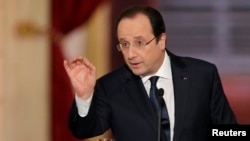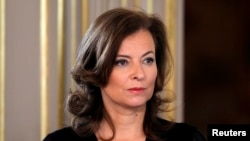PARIS —
His official partner, Valerie Trierweiler, is in hospital recovering from shock after a celebrity magazine published pictures of what it said was Hollande wearing a motorcycle helmet visiting actress Julie Gayet for nocturnal trysts.
“Everyone in their personal life can face trials. That is our case,” Hollande said when a French reporter ventured a coy first question about Trierweiler's future as first lady.
President Francois Hollande brushed away questions about an alleged affair with an actress on Tuesday and unveiled moves to ease company taxes, cut labor charges and trim France's high public spending to revive a stagnant economy.
He called for France and Germany to harmonize corporate taxation and create a joint venture to manage the transition to renewable energy, modeled on European plane giant Airbus.
With over 500 journalists packed into the Elysee Palace ballroom for a New Year news conference, the Socialist leader, deeply unpopular with voters, made no mention of controversy about his private life in a 30-minute introductory speech and defiantly stonewalled on the subject for the next two hours.
His official partner, Valerie Trierweiler, is in hospital recovering from shock after a celebrity magazine published pictures of what it said was Hollande wearing a motorcycle helmet visiting actress Julie Gayet for nocturnal trysts.
“Everyone in their personal life can face trials. That is our case,” Hollande said when a French reporter ventured a coy first question about Trierweiler's future as first lady.
“These are painful moments ... This is neither the place nor the time to [discuss] that,” Hollande said, adding that he would clarify the issue before a visit to the United States on Feb. 9, on which Trierweiler had been due to accompany him.
The president said he had chosen not to sue the magazine Closer for invading his privacy because as head of state he was immune from being sued himself and did not want to create a double standard. He did not deny the reported affair.
The French are traditionally indulgent of their leaders' sexual indiscretions, and an opinion poll on Sunday showed an overwhelming majority said it did not change their view of Hollande, who was entitled to privacy in his personal life.
Ditherer no more?
Before the embarrassing publication, he had become the least popular French president in modern times, largely due to tax increases, recession and high unemployment, compounded by a reputation for dithering.
Hollande sought to erase that image and adopt the clothes of a social democratic reformer as he set out a “responsibility pact” to cut the tax and regulatory burden on companies in return for commitments to create jobs and boost training. As part of that drive, employers will no longer fund family allowances via payroll taxes from 2017.
He promised a further 50 billion euros ($68 billion) in spending cuts in 2015-17 on top of a planned 14 billion this year, saying they could be achieved by making national and local government more efficient while preserving France's generous social model.
“This is the biggest [initiative] proposed in our country for decades,” Hollande said, teasing conservative predecessor Nicolas Sarkozy for promising reforms but not delivering.
In first reactions, market economists welcomed the change in tone but were more measured on the content, noting the new moves represented a slight deepening of already planned cuts and that some funding details remained unclear.
Ion-Marc Valahu, fund manager at Geneva-based Clairinvest, said: “At least he's acknowledged that there are issues that need to be solved for the economy to recover, but they need to do a lot more to slow down the pace of job destruction. He can say what he wants, but 2017 is a long way to go.”
“More and more, the future French economic policy will look like that of the previous conservative majority,” said Dominique Barbet, market economist at BNP Paribas.
France's hard left accused him of a sell-out. “This is a real social irresponsibility pact,” said the Communist party's National Secretary Pierre Laurent, complaining of an attack on the French social model.
Defense of Europe
Hollande, who defied street protests to legalize gay marriage last year, signaled he was ready for a new controversy by announcing plans for a law allowing terminally ill patients to end their lives under strict controls.
Hollande defended the European Union ahead of European Parliament elections in May and said he would not let Eurosceptics who want to pull France out of the euro prevail.
A recent poll suggested the anti-EU far-right National Front could come first in the European election in France, often used to register a protest vote, ahead of both the mainstream conservative opposition and the Socialists.
His proposal for a Franco-German joint energy company caused some surprise in Berlin, but officials said the two countries' environment ministers had been working on a detailed joint energy transition plan last year, until the French minister was sacked for criticizing budget cuts.
Previous French announcements of joint industrial projects with Germany have often come to nothing or little, partly because private German industrialists are reluctant to work with state-influenced French companies.
Half a dozen journalists tried during the event to follow up with questions on Hollande's personal life, but to no avail.
A similar event staged by predecessor Nicolas Sarkozy after his 2007 divorce was dominated by curiosity over his romance with singer Carla Bruni, whom he subsequently wed. When Sarkozy played up the relationship, opinion polls suggested voters disapproved of the flaunting of his personal life.
Conservative former premier Alain Juppe jokingly entered the debate over whether Trierweiler remained France's unofficial First Lady.
“In France we have a status for everything — perhaps now we'll also have one for the Second Lady.”






